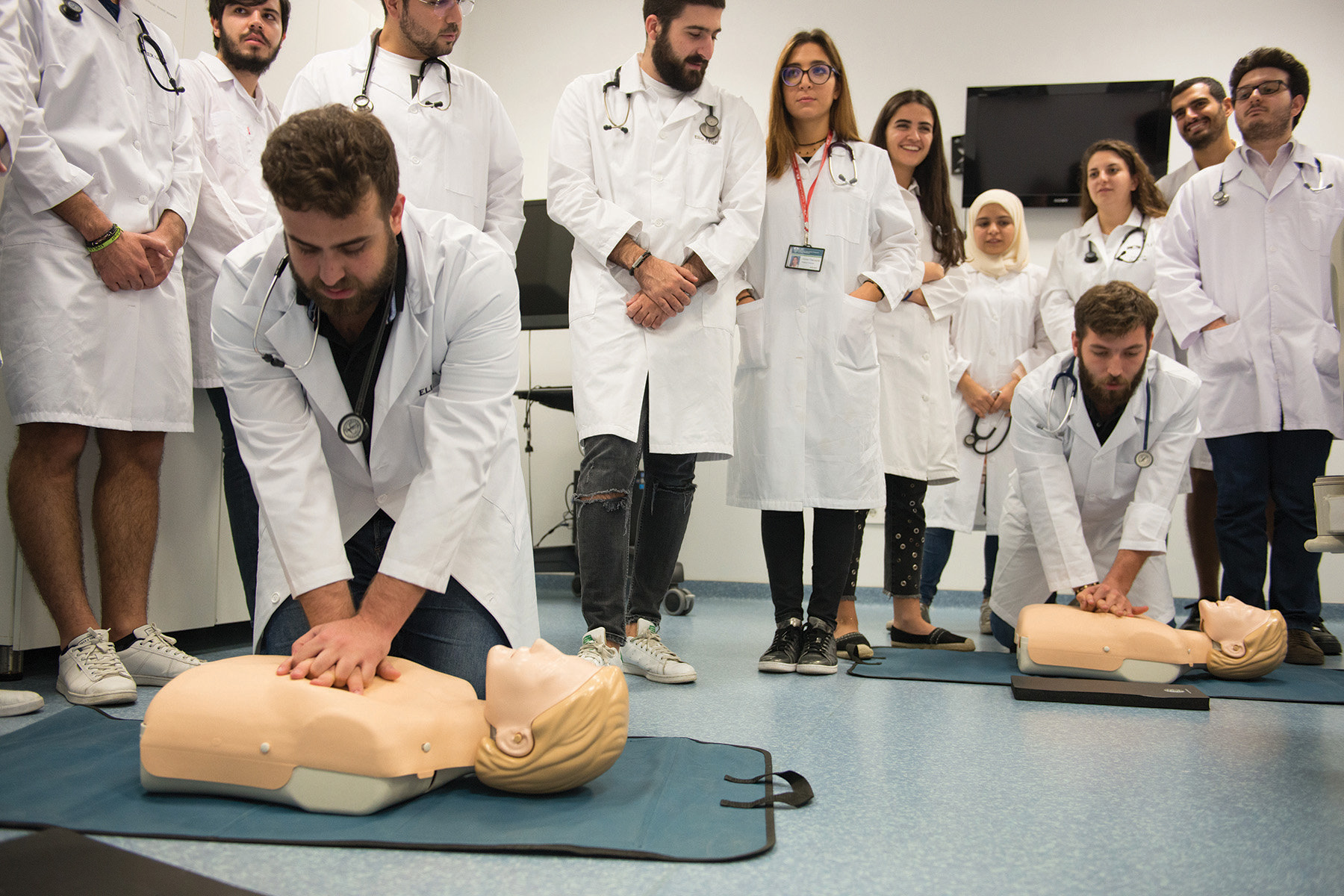The Blueprint for the White Coat
More in this issueSOM experts get students up to speed on landing the right residency, choosing a specialty and thorough financial planning.
Committed to providing its students with a high-quality American medical education, the Gilbert and Rose-Marie Chagoury School of Medicine (SOM) has offered for years a thorough career guidance program in which students, after going into their residency, choose a specialty based on a comprehensive understanding of the career that they are about to launch.
In this spirit, professors share their own experiences, walk students through the steps required for local and international residency, and help some undecided students gain an in-depth understanding of what each specialty entails.
According to OBGYN Residency Program Director Ziad Hubayter, it is critical that students get a head start – as early as the Med I year. “To help,” he added, “SOM faculty have compiled thousands of pages of scientific matching data from the Association of American Medical Colleges, the Educational Commission for Foreign Medical Graduates and the National Residency Matching Program, to guide students on credentials, skills and personality traits that are best matched with a specialty or residency.”
While sessions cover tips for the interview and application processes for US and local residency programs – including the LAU Medical Center-Rizk Hospital – career planning does not stop there.
For example, dermatology residents at LAU sat for the Basic Exam administered by the American Board of Dermatology in order to benchmark against their peers in the US. They scored well above the average there. “These results demonstrate that the LAU dermatology program is among the best international programs outside the US,” said Dermatology Department Chair Dr. Zeina Tannous, adding that the students’ scores matched those of the prestigious US programs.
“Our students are our pride,” declared Dr. Rajaa Chatila, assistant dean for Graduate Medical Education at LAU, adding that she feels an obligation to help excelling and qualified students learn about as many residency opportunities as possible. “Through LAU’s continuous work expanding its network of partners across medical centers, we hope to open more opportunities for our students to acquire residency experience.”
Dr. Chatila also hopes to identify areas of specialty that are much-needed but underserved in Lebanon. “This is a thorough study that should happen in collaboration with the Ministry of Public Health, which could enable us to fill the gaps and guide our students in the right direction,” she added.
To this extent, SOM program directors and department chairs give overviews of the 17 specialties and their required credentials. They discuss at length important markers such as job-market saturation, the need for certain specialties, potential income and the lifestyle associated with each.
For students aspiring to pursue clinical research or looking to enhance their chances of matching with a residency program, a session is set up to help them get an idea of the options available to them. “Instead of curing one patient at a time, our graduates have the potential to diagnose and cure thousands through research,” said Dr. Naji Riachi, assistant dean for clinical research, who explained that similar to residency training, to get into clinical research, students have to apply for a fellowship and go through a rigorous matching process. He hopes that with a new wave of fellows, “We will be able to spread a culture of much-needed clinical research in Lebanon and the region.”
Faculty also invite alumni for interactive Q&A sessions to help students draw a more accurate illustration of what awaits them post-graduation. At a recent event, Drs. Remie Chrabieh and Rana Asmar shared firsthand accounts of their applications to residency both in Lebanon and the US and the challenges they faced, providing students with additional tips on what to expect.
Apart from acquiring medical knowledge and putting it into practice, Dr. Hubayter also deemed it necessary to draw students’ attention to financial and business management, which helps equip the future doctors with the knowledge needed to succeed in any field. “From saving accounts to retirement funds and insurance plans, these are basic skills that anybody should know,” pointed out Dr. Hubayter, drawing from his personal experience of earning an MBA to help him in his medical career.
Thanks to thorough career guidance, students are able to take a step back and paint a comprehensive picture of what becoming a doctor truly entails. “Much like in any other profession, we want to teach our students to become good fishermen rather than provide them with the fish,” concluded SOM Dean Michel Mawad.
